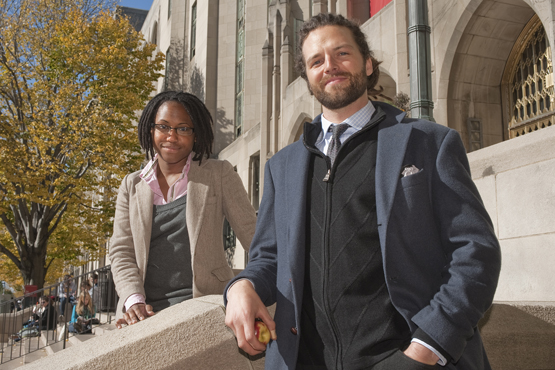Taking on Afghanistan
The Great Debate brings the war to center stage

President Barack Obama may do well to recruit two Boston University students for input into a key foreign policy question plaguing him: is the war in Afghanistan worth fighting?
Along with well-known national experts, tonight, November 4, Abram Trosky and Kenice Mobley will take opposite sides of the complicated political issue at the College of Communication’s biannual Great Debate. Trosky (GRS’10) will argue for the war, while Mobley (COM’11) will argue against.
“Even a century-plus of American hypocrisy in imposing ‘democracy’ and rhetorically abusing liberty does not, cannot, nullify the principles for which we sometimes must fight,” says Trosky, who hopes to teach political science at the college level. “Citizens have a role in upholding these principles by exerting democratic pressure for policy makers to connect the ‘why’ with ‘how’ we fight.”
Mobley takes a different view. “Our goals and initial objectives are not being met” in Afghanistan, she says. The COM film production student plans to argue that the eight-year-old war is not financially sustainable.
Traditionally, the Great Debate takes a hot-button issue and throws it open for discussion by a panel of experts and students. At the end of the two-hour event, moderator Robert Zelnick, a COM journalism professor and former longtime ABC News reporter, will ask the audience to take sides — literally — by moving to either side of the Tsai Performance Center to determine the winners.
The debate is certainly timely, as Obama wrestles with a decision about following the recommendation of his top U.S. commander in Afghanistan, General Stanley McChrystal, to send at least 40,000 more troops to the troubled country.
As always, Zelnick has recruited some heavy hitters to weigh in on the issue. Thomas Johnson, a research professor and director of the Program for Culture and Conflict Studies at the Naval Postgraduate School, and Marin Strmecki, senior vice president and director of programs at the Smith Richardson Foundation, will team with Trosky on the affirmative side. Andrew Bacevich, a College of Arts & Sciences professor of international relations and history, and Nick Mills (DGE’62, COM’64), a COM associate professor of journalism, who has worked in Afghanistan and written a book about Afghan President Hamid Karzai (Hon.’05), will argue with Mobley on the negative side.
If the effort so far is any indication of things to come, this year’s debate should be particularly contentious. In a predebate debate about what to name the event, participants rejected several suggestions before settling on Is the war in Afghanistan worth fighting?
“This is the first time in 27 debates we’ve ever had an issue with the title,” says Lauren Glaser, COM’s event coordinator.
Selecting the student debaters was a simpler task. Trosky and Mobley were among a handful of graduate and undergraduate students who auditioned, each preparing a four-minute argument for their side. “We really look at who has the better debating skills,” says Glaser, who with Zelnick chooses the student participants.
Both student debaters have some experience in persuasion. Mobley was the secretary of her high school debate team and president of its mock trial team. Trosky has moderated debates as a teacher and once defended Christopher Columbus in a high school history class.
The approach of finals makes this a tough time for a student to think about solving the world’s problems. For the past two weeks Mobley has juggled preparing her thesis and researching the debate topic. Friends with an interest in political science have been available to discuss the issue, and this has helped her polish her arguments.
Trosky has been balancing his teaching duties with diving back into books on American foreign policy. Conveniently, his current research is on just war theory.
Both students say they feel privileged to be on the same stage with well-known Afghanistan experts. Still, Mobley says, “I think it would be silly not to feel a little bit nervous on stage.”
BU’s professional debaters receive an honorarium for their participation; students get the honor of arguing with some of the nation’s best minds. Earning the audience’s approval is another plus.
“I will be personally content if my words challenge the opinion of attendees and viewers,” Trosky says.
The Great Debate will be held from 6:30 to 8:30 p.m. on Wednesday, November 4, at the Tsai Performance Center, 685 Commonwealth Ave. The event is free and open to the BU community. Seating is first-come, first-served. For more information, contact Bob Zelnick at 617-353-5007 or at bzelnick@bu.edu.
Leslie Friday can be reached at lfriday@bu.edu.
Comments & Discussion
Boston University moderates comments to facilitate an informed, substantive, civil conversation. Abusive, profane, self-promotional, misleading, incoherent or off-topic comments will be rejected. Moderators are staffed during regular business hours (EST) and can only accept comments written in English. Statistics or facts must include a citation or a link to the citation.